| dc.description.abstract | Abstract:
Two of the main challenges in contemporary strategy are the challenges of complex conflicts and the increased reliance on alliances and coalitions. This study explores the challenges of coalition strategy in the complex conflict of Afghanistan through the strategic behaviour of three NATO-states, the United Kingdom, the Netherlands and Norway from 2003 to 2008. The study argues that the use of alliances and coalitions is and will remain one of the most important features of contemporary strategy. Given the size and character of contemporary coalitions and alliances, an essential part of any coalition’s strategy both in development and execution will reside with a coalition’s lesser members. Understanding how these lesser coalition members develop and implement strategy will be of great importance to the effectiveness of contemporary and future coalitions.
The three states analysed in this study are the United Kingdom, the Netherlands and Norway, three states who faced similar challenges in Afghanistan. The strategic behaviour of these cases is analysed through the lens of strategic theory from which the framework of analysis was developed.
The study found that the three states’ interpretations of ISAF’s aims were remarkably different and that this impacted their strategies significantly. The study also found that as the lesser coalition partners’ purpose behind joining the coalition was only indirectly linked to the complex conflict of Afghanistan itself, the lesser members struggled to generate the political involvement that is crucial to the development of a clear and relevant strategy. Further, the study also found that this lack of political involvement had its main source in the lack of proper strategic institutions and procedures in each state’s civil-military relations structure, but was also clearly impacted by the states’ strategic thinking. The study challenges certain elements of traditional and contemporary theory on strategy and civil-military relations with respect to the lack of realism in strategic theory and an over-emphasis on structures in current civil-military relations theory. | nb_NO |
